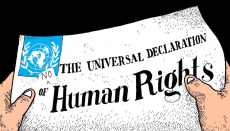
Email: ZYVC057@live.rhul.ac.uk
Total Article : 213
About Me:I'm a graduate student studying International Criminal Law and first started writing for King's News almost 4 years ago! My hobbies include reading, travelling and charity work. I cover many categories but my favourite articles to write are about mysteries of the ancient world, interesting places to visit, the Italian language and animals!

In the aftermath of WW2 US President Roosevelt’s elaborated the idea of a New World Order based on a four point strategy which encompassed peace, human rights, trade and finance. Since then, the human rights has become a cornerstone concept of many fields, including international law. Today there is a universal standard of human rights which regulates and monitors the responsibility of States to protect certain values. This article will discuss the lengthy road which formed the principle human rights which are embedded in our legal system today. In doing so we shall see how far society has come in framing rights and how much there is still left to do in terms of ensuring the respect of universal rights.
Human rights and the UN
In its preamble, the UN Charter incorporates as an institutional objective its protection of human rights. There are a few provisions speaking to the overall Human rights architecture and is one of the purposes of the international institution. In particular, article 1.3 of the UN Charter establishes the purpose of the UN directly in the context of human rights:
“To achieve international co-operation in solving international problems of an economic, social, cultural or humanitarian character, or in promoting and encouraging respect for human rights and for fundamental freedoms for all without distinction as to race, sex, language or religion”.
Article 56 poses such an obligation on member States. This has led some scholars to argue that the UN is bound by human rights, however we will soon see that only States can sign treaties and as the UN did not sign or ratify any of the human rights treaties or conventions present today, the UN cannot be held liable for abuses of human rights.
Article 103 expresses one of the most important notions present in the UN Charter. It states:
“In the event of a conflict between the obligations of the Members of the United Nations under the present Charter and their obligations under any other international agreement, their obligations under the present Charter prevail”.
This provision “in case of conflict” directly applies for violations of fundamental rights. This means that any national policy which violates HR it is seemed as void, under the national law hierarchy. Under international law Article 103 prevails.
ECOSOC’s commission on human rights
Article 68 of the UN Charter set up the ECOSOC as one of the six main organs of the UN. In 1946 ECOSOC set up commission on Human Rights and became the principle organ of UN which dealt with matters related to Human Rights. In 2005 the Human Rights Commission was set up as what we know today as the Human Rights Council.
The Commission 1946-2005 had to carry out 3 important tasks:
Draft an international bill of human rights which would be a declaration not a treaty (hence non-binding).
To convert that declaration into a legally binding document (treaty).
Draft document for implementation of those rights (including committees for Human Rights complaints to be filed against nations).
IMAGE SOURCE: https://www.vice.com/en_uk/article/exm87w/the-us-declaration-of-no-human-rights-guantanamo-bay-812

0 Comment:
Be the first one to comment on this article.